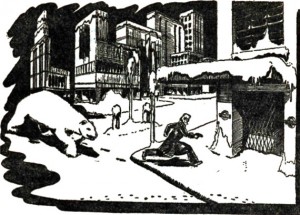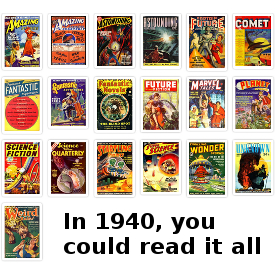
A recurring question that seems to refuse to go away in our house is, “where would be the best place to go in an apocalypse?” Sure, the obvious would be someplace with supplies, weapons or food. Perhaps where there is dense population, relying on safety in numbers. Or maybe a fortress scenario, but we’ve seen what can happen if you break “into” a prison for the security.
Regardless the argument, my answer has never wavered. The ultimate source of knowledge in a post-internet age would be a place that allows the inhabitant to strive by simply going back to the basics. And where would this knowledge be stored? We’re talking books. You can call it your survival structure, your sanctuary, or even your lair if you’re intent on world domination after the fall, but the most resourceful place on the planet would have to be the library.
I don’t hold the rights to this theory. This is an idea that goes back ages, even in science fiction fandom, and I would have to whole heartedly agree. The Forgotten Enemy touches on the subject with its eye opening tension and emotional speculation. This very short story by Arthur C. Clarke first appeared in the August 1949 issue of New Worlds Vol 2, #5: Fiction of the Future (from Nova Publications Ltd., edited by John Carnell) with the ominous tagline “Man had fought many battles, but there was one enemy he had forgotten about entirely…” Though this review is based on the version from the 1978 Puffin Publishing anthology “The Worlds of Arthur C. Clarke – Of Time and Stars,” the story hasn’t changed and neither has its implications of imminent doom.
Just as relevant today as it was over sixty years ago, readers get to decide for themselves who The Forgotten Enemy really is in this short story about global disaster and the consequences it has on the survivability of man.
Professor Millward is holed-up in the University library for over twenty years, all alone, long after other London inhabitants fled the city with hopes of colonizing in the lower warmer regions of the globe. Britain’s climate had plummeted to arctic temperatures after a belt of cosmic dust had blocked the nurturing power of the sun’s rays, returning this world to the ice age. In the early days of the change, the professor monitored the exodus, but eventually lost contact with the outside world over time.

With the help of the resources at hand and an occasional looting expedition to the surrounding area, he has miraculously endured. In the absence of humans, the wildlife begin to savage the land. But over time, even the wolves and polar bears disappear. The loneliness is derived not only from the missing populace, but from a lack of life in general.
Consumed by the isolation and nearing madness, the Professor yearns for word from the outside world. He dreams of hearing voices once again, of proving that humanity still exists. But it turns out that the thunderous sounds approaching from the north is not the rescue of humanity he yearned for, but the imminent crashing push of a glacier.
Surrounded by seemingly unlimited resources and blinded by his own desire to return to the normalcy of population, the Professor neglects to see the natural villain in this story. The glacier is the powerful fist of the forgotten enemy, the returning ice age.
But if you return to the topic of surviving an apocalypse and utilizing the powerful tools within the library, it’s difficult to believe a professor would not be able to deduct what has been happening. That is unless you take into account the emotional toll that loneliness can play on the human condition. And at this point, the forgotten enemy is the frailty of man.
Be it your current concerns about global climate change, a fascination with end-of-the-world scenarios, or just the joys of being part of fandom, The Forgotten Enemy by Arthur C. Clarke is one of those stories that will make you think long after you’ve put it down. And if you have problems finding a copy when the end comes, you can just stop by my lair where I will be surrounded by books.










